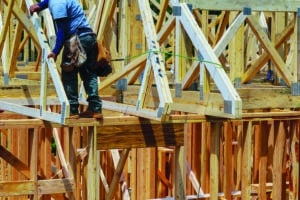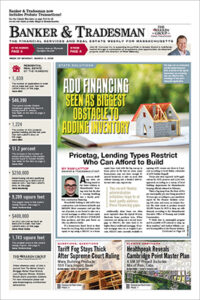A prominent housing advocacy organization is planning a major expansion to its efforts to fight the high cost of housing.
The Boston-based Barr Foundation awarded Abundant Housing Massachusetts $500,000 to launch an organizing and education campaign across Eastern and Central Massachusetts just as communities are grappling with how – or even whether – to comply with the state’s new MBTA Communities transit-oriented zoning reforms. The reforms require each of the 175 cities and towns served by the MBTA, except Boston, to create zoning districts at least 15 acres in size that will let developers build multifamily zoning by-right, with the minimum density set at 15 units per acre, roughly comparable to a neighborhood of three-deckers. Failure to comply will lose them access to a basket of state infrastructure and economic development grant programs.
The goal, AHMA said in a statement announcing the grant, will be to empower local, pro-housing advocates with tools to build support for more multifamily zoning as a way to address racial inequities and build more affordable and greener communities. More liberal zoning laws geared at multifamily development, the group and other “Yes in My Backyard” activists contend, will help moderate home prices and rents by reducing the risk of bidding wars, and make it easier to build affordable housing in suburbs that continue to block it decades after redlining was made illegal.
“We are so grateful to the Barr Foundation for their support as we educate and organize to ensure we get meaningful zoning reform in every MBTA community. The MBTA Communities law opens the door for accessible choices. This a much needed step towards building the homes we need across Massachusetts,” AHMA Board President Molly Goodman said in a statement.
With the grant in hand, AHMA hopes to hire two new organizers who will help existing local groups pushing for zoning changes in their communities and help launch others. The organization also plans polling and marketing and education campaigns in “selected communities” aimed at building support there for more housing.
Communities face their first deadline at the end of 2023, when all 175 communities must submit “action plans” to the state Department of Housing and Community Development that show they’ve set up a process to comply with the rezoning law. Communities with subway service like Milton and Newton must also have their multifamily zoning districts in place by then.
“AHMA’s MBTA Communities organizing and education program will propel Massachusetts forward by working towards implementing multi-family zoning in neighborhoods across our region. By expanding our staff and unique capacity, we will focus on what is most important; deep grassroots organizing and community engagement. We will not only lead statewide advocacy and collaboration, but lay the important groundwork of building the infrastructure necessary for housing production and getting us closer to inclusive, sustainable communities,” AHMA Executive Director Jesse Kanson-Benanav said in a statement.







